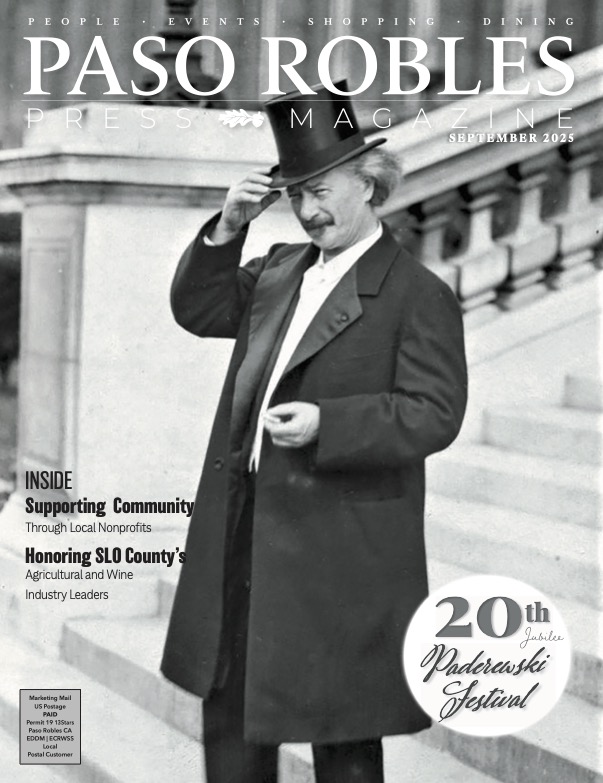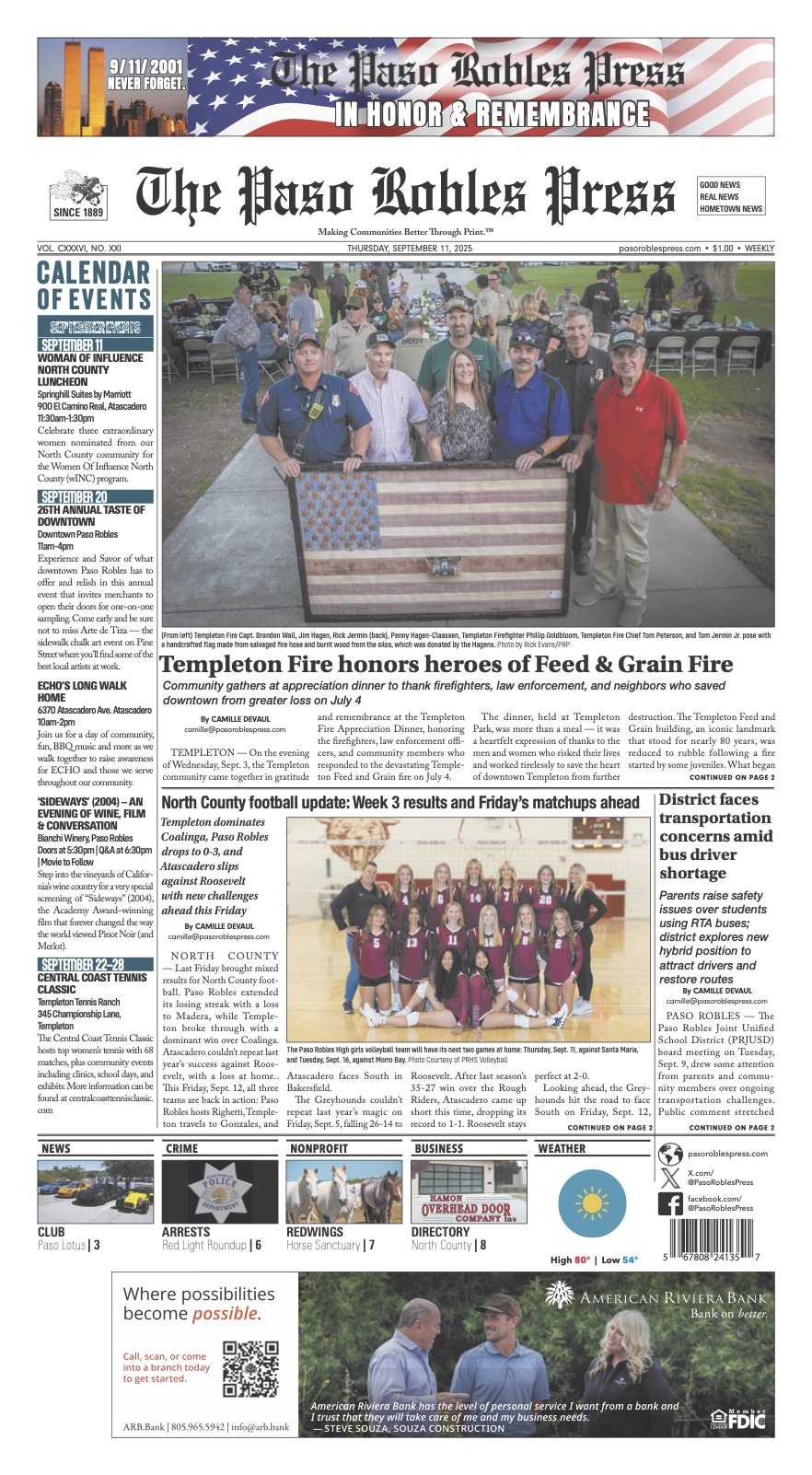Are biodynamic farming practices the wave of the future for Paso Robles winegrowers? Or is “biodynamic,” as some insist, hippy-dippy voodoo?
Of late this form of alternative and conscious agriculture has entered the cosmos of Paso winemakers who claim to see considerable benefits in this holistic approach that ensures wellness of the soil and the vineyard.
Biodynamic agriculture goes a step beyond organic farming: such as preparation of special teas made from chamomile, dandelion and nettles that are regulated by the lunar calendar when applied to the soil to, cow horns buried for manure, biodiversity of plants and animals and all pesticides strictly forbidden.
Skeptics call these practices hippy-dippy or mumbo jumbo. But ask a dedicated biodynamic farmer and he/she will point to the health of the vineyards and honoring it as the gold standard of farming.
“There are naysayers, absolutely,” acknowledged Cris Cherry. “Like the yin and yang, there’s quantitative and qualitative. The naysayers are more quantitative people — they cannot wrap their head around this.”
Owner/winemaker of Villa Creek Cellars, Cherry and his wife Joanne began biodynamic practice in 2015. The westside vineyard is among three Demeter certified vineyards in Paso. (Demeter USA, the only certifier of biodynamic farms was established in 1985 to advocate biodynamic agriculture).

Booker Vineyard
“Our Catapult Vineyard was suffering from conventional farming,” said Epoch Estate Wines’ winemaker Jordan Fiorentini about the decision to switch to biodynamic in 2012. “It was lifeless.” Now all 150 acres of grape plantings spread among the Paderewski, York Mountain and Catapult Vineyards are farmed biodynamic. Visitors often comment on the health of the vineyards, she noted.
Along with Epoch and Villa Creek, Booker Wines, Tablas Creek Vineyards, Ambyth Estate, Sinor-LaVallee, Jada and Giornata are among the few Paso wineries following this practice.
The biodynamic movement was pioneered by Austrian philosopher and scientist Dr. Rudolph Steiner in response to widespread use of commercial fertilizers by farmers at the turn of the 20th century. Steiner’s philosophy encompassed the whole cosmos, in which the air, water, soil, sun and moon play a role in farming.
Farming practice is regulated by the biodynamic calendar, for example, with Fruit days best for harvesting and Root days ideal for pruning. Leaf days call for watering and it’s best to leave the vineyard alone on Flower days.

Cris and JoAnn Cherry
In Paso, Ambyth is renowned as Paso’s first vineyard and winery (currently under production) to get the Demeter certification in 2006. Ambyth is also a Stellar-certified organic farm.
Founders and dedicated practitioners Phillip and Mary Hart are totally immersed in biodynamic: “That’s how we are farming and why the land will last forever,” said winemaker Phillip. Honoring his heritage, Hart appropriately named the winery Ambyth, which in Welsh means forever.
“We feel we are not taking from the land,” Phillip told me recently at his hilltop home in Templeton. “We are not even keeping the land in its pure natural state. We are actually enhancing the land by using these biodynamic practices.”
A conventional vineyard, Phillip noted, typically gets replanted every 18 and 25 years. “But a biodynamic is somewhere in the region of 100-150 years.”
Ambyth’s hillside estate is planted to 20 acres of mostly Rhône varieties with some tempranillo and sangiovese. All are dry-farmed and head trained, thus reducing dependency on irrigation and energy.
Biodiversity is in abundance on Ambyth’s ranch — the linne calodo soil is inoculated with biodynamic preps and compost; chickens in the portable coop range freely among the vines eating insects and scratching the soil while fertilizing with their manure; cows, an excellent source for weed control, aerate the soil with their hooves; bee hives secured in the middle of the estate play a vital role in pollinating fruit and nut trees and native plants; and some 600 Spanish varietal olive trees produce biodynamic extra virgin olive oil.

Tablas Creek wines
The Harts go the distance and also produce a biodynamic wine also known as natural wine. Most biodynamic winegrowers and farmers don’t necessarily produce biodynamic wines (also known as natural wines), which come with its own set of rules and regulations. To qualify as a biodynamic wine, fermentation must be done from indigenous yeasts, no additives are allowed and usage of sulfites is limited (only 100 parts per million). “What you get in our glass is true grape,” Phillip confessed. “Natural wine has its own uniqueness.”
At Epoch, vineyard consultant Philippe Armenier’s practice includes preparations that are mixed with compost and spread in the vineyards “We buy organic cow manure and compost it,” Fiorentini explained. The lunar calendar is followed, especially in the vineyard and during bottling. Fiorentini goes one step further and follows the calendar for tasting especially with wine critics. “I’m not superstitious, “ she admitted, “but wine tastes different on different days and I have the information, so why not?”
Epochs’ vineyards are not Demeter certified. “We are not doing it for pedigree or marketing,” Fiorentini explained about the winery’s decision to forego certification. “We are doing it for the health and quality of the vines and it’s working.”

Philippe Armenier, Epoch Estate WInes
Tablas Creek that was planted in the 1990s as organic vineyard received its Demeter certification on its 110-acre property in 2016. Winemaker Neil Collins added, “My personal perspective on this is to find the best form of farming on this piece of property; biodynamic and organic is just a step to that goal.”
Eric Jensen, owner/winemaker of Booker Wines, is not one to belong to clubs or organizations. Therefore his vineyard on Paso’s westside is not Demeter certified. But he follows the practice to a tea — with usage of biodynamic preps and teas. “We do everything that’s good for the soil and surroundings,” said Jensen, a former Orange County resident and music professional turned winemaker.
Jensen had an “aha” moment 12 years ago when he was applying gopher poison in his vineyard. “What am I doing?” he wondered. The headaches he was suffering from stopped soon after his decision to go organic and later transitioned into biodynamic. “There was an energy about biodynamics.”
The winemaker recognizes the big pendulum swing in the health of his vineyards. His practice includes integration of livestock in the vineyards, application of teas and forgoing pesticides and chemicals.
“All I can tell you is that the vineyard is twice as healthy,” Jensen said.
Jensen admitted biodynamic farming practices are cost prohibitive. “But we have set money aside to invest in getting better, I call it R&D,” he said, adding that he keeps scientists and phenolics experts on his payroll. “It’s an emotional and financial commitment.”

SInor- LaVallee’s Bassi vineyard in Avila Beach
Mike Sinor, owner/winemaker of Sinor-LaVallee Wines, was indoctrinated in 2001 while interning at Edna Valley’s Domaine Alfred (now Chamisal). His 30-acre organic Bassi vineyard in Avila Beach transitioned to biodynamic in 2013. Since then he has noticed dramatic changes in his vineyard planted to pinot noir, chardonnay, syrah, grenache and albariño. “Plants are healthier and vineyards looking better,” he said.
Sinor makes his own materials and does bury the cow horn, selecting a spot close to the vines and on a slope. “That horn has flesh, fungi and bacteria,” Sinor told me. “I take all that shit and applied it to the ground.”
And what about the wine, I ask?
“In my opinion, our wine has more vitality and is more an expression of the place,” Sinor answered.

A flock of sheep and a llama at Ambyth Estate
“We’ve always been close to our food source,” said Cherry of the former walnut orchard turned into a vineyard. Part of the biodiversity on his farm includes a flock of sheep that mows and fertilizes the soil. “We work with our environment so we can continue to build energy in our soil for many generations.”
Cherry is in the process of applying for Demeter certification for his winery as well. For him, biodynamic farming is more transparent and there is purity to the fruit. “Many great wines of the world I’ve tasted have been biodynamic,” he noted. “There are forces in this world we can’t explain — they are what they are.”
So is the movement gathering a momentum on Central Coast?
“There is a definite move toward organic and biodynamic,” Cherry insisted. Sinor notices a level of interest too: “I’ve been around for 20 years and it’s increasing in popularity and exposure,”
Last year Tablas Creek hosted a seminar on biodynamic preparations. More than 30 winegrowers attended the sold-out event, a good sign that the movement is gaining respect on the Central Coast.










